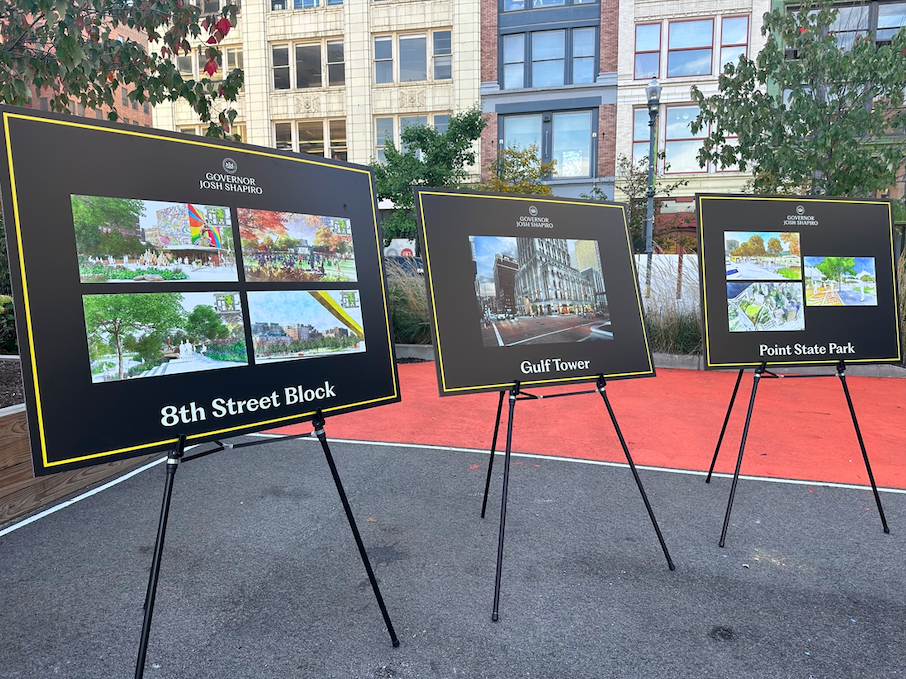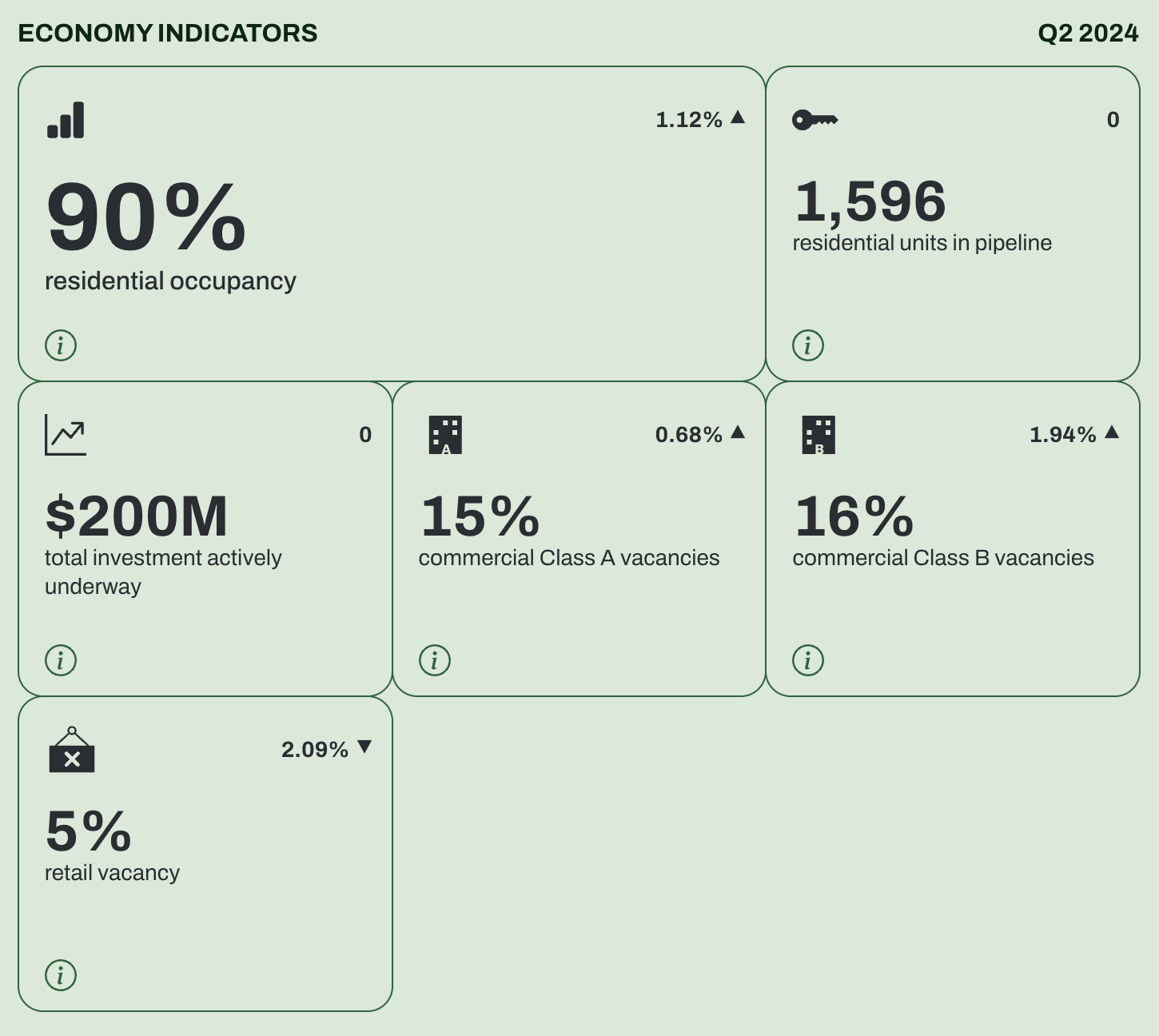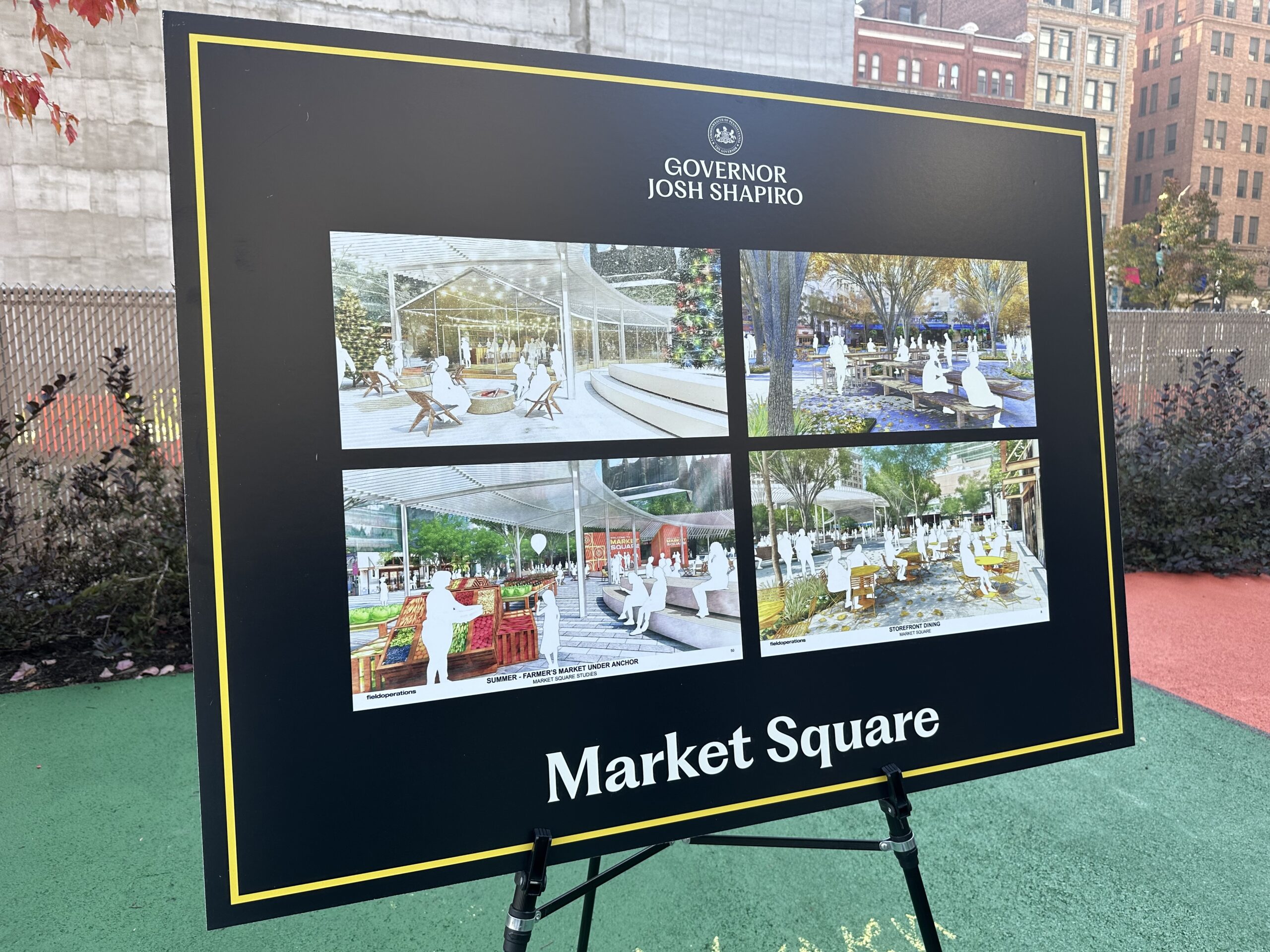Pittsburgh’s abandoned office buildings, underutilized lots and public spaces are getting a much-needed makeover to boost downtown as an economic engine.
Pittsburgh’s downtown revitalization efforts are receiving nearly $600 million of public, private and nonprofit investments to be committed to “shovel-ready” projects to be completed over the next four years.
Governor Josh Shapiro and other local leaders gathered in Pittsburgh’s Cultural District on Friday to unveil the collaborative effort to invest in the city. Efforts to revitalize Pittsburgh’s Golden Triangle would include transforming old office buildings into housing and restarting a business support program to incentivize people and companies to move downtown.
“I firmly believe that in order for our commonwealth to fully thrive, we need to ensure that downtown Pittsburgh, this neighborhood where we are today, is a hub of innovation, is a hub of culture and is a hub of opportunity for all,” Shapiro said at the announcement.
The Shapiro administration has pledged $62.6 million, while the City of Pittsburgh will contribute an additional $22 million through the Urban Redevelopment Authority (URA). A coalition of private sector leaders and regional foundations have also raised $40 million, with more to come, in support of the downtown revitalization plans.
These investments are expected to generate an additional $377 million in private sector funding for real estate developments downtown and create over 3,500 construction jobs over the next four years, according to Pennsylvania’s Department of Community and Economic Development (DCED).
The investments play into a 10-year strategy to revitalize the area by focusing on three primary objectives: improving public space, attracting more residents and businesses to downtown and creating cleaner, safer streets.
However, the plan does leave “a lot of room for entrepreneurial spirit” and future investments, said David Holmberg, president and CEO of Highmark Health.
3 iconic downtown spaces to be transformed by investments
Earlier this year, the city and the Allegheny Conference on Community Development released a Downtown Revitalization Vision Plan to be executed over the next two years.
According to the city’s plan, the region’s growing tech sectors, including AI, advanced manufacturing and energy, are not seeking traditional upper-floor commercial office space.
One of the top strategic redevelopment goals for the project was for downtown to become an economically competitive business environment that attracts, retains and encourages a diverse range of businesses.
With the recently announced investments, the city plans to do just that:
- 8th Street Block Civic Space: This $30 million project, led by the Pittsburgh Cultural Trust, will convert underutilized parking lots and open space in the Cultural District into a new outdoor space to host festivals and performances. The 8th Street Civic space will feature a bandshell, family play area, public restrooms, green space and public art.
- Market Square and Liberty Avenue Medians: A $30 million renovation of Market Square and the Liberty Avenue Medians will improve paving, add benches and tables, expand dining spaces and improve capacity for more events and markets. The median project will connect Point State Park to Market Square, with the goal of “spurring private investments in the heart of downtown.”
- Point State Park: Shapiro’s administration will invest $25 million into a series of projects that will improve pedestrian access to the park, including updates to lighting at the fountain and additional recreational activities at the cityside lawn. Improvements to walkways and the fountain will be complete in time for the 2026 NFL Draft.

“Like many cities across the country, we were struggling to overcome the aftermath of the COVID-19 pandemic,” Mayor Ed Gainey said at the announcement, “and where a lot of people saw adversity, I wanted to make adversity my friend and find an opportunity … to reimagine what downtown can look like.”
Despite downtown being the second largest employment center in the state and the employment location of 74,000 workers, downtown employees have declined by 17% since 2002 due to business closures or relocations, according to the revitalization plan.
“While some may view Pennsylvania's downtown’s, main streets and central business districts as relics of the past, the governor and I view them as engines for our economic future,” Lieutenant Governor Austin Davis said at the announcement.
Transforming abandoned office buildings into housing
Downtown will move forward with seven major mixed-use developments and housing projects, using $501 million in combined investments to create and preserve nearly 1,000 residential units. A third of the units will also be made affordable to low and moderate residents.
“Allegheny County is working hard to incentivize conversions from commercial to residential buildings,” Allegheny County Executive Sara Innamorato said in a news release.
Five of the mixed-use projects, resulting in 800 total new residential units and 135 new affordable units, will be funded by $22 million from the commonwealth, a chunk of the $62.6 from the Shapiro administration.
- Gulf Tower: The former Gulf Oil headquarters will be converted into a 225-unit apartment building with a 147-room hotel and street-level commercial space.
- City Gulf Apartments: A 294-unit residential complex, including restaurant and retail space, will be built at the site of the former YWCA headquarters.
- The Porter: An old office complex on the city’s main commercial corridor will be transformed into 165 new residential units, with efforts to preserve the street-level retail space.
- 933 Penn Avenue: An old office complex will be transformed into 70 new residential units with street-level commercial space.
- Smithfield Lofts Building: Office space will be converted into 46 new residential units, with additional improvements to the remaining office space.
- First and Market: A former office building will be converted into a 93-unit affordable apartment building.
- May Building: Preservation work will be done on 86 existing apartment units.

A business support program and increased police presence
A series of initiatives run by Allegheny County, the City of Pittsburgh and partner nonprofits will invest in public safety, street cleaning and growing the downtown small business scene.
- Boosting local businesses: The Pittsburgh Downtown Partnership (PDP) has committed to reopening its small business support programs with donations from Duquesne Light, FNB and Giant Eagle, tax credits from the DCED’s neighborhood Assistance Program and investments from the Hillman Foundation. The program will help small businesses relocate or expand downtown. PDP will also expand efforts to clean up sidewalks and alleyways.
- Investing in public safety: The Steelers, Pirates and Penguins have committed over $2 million to fund the onboarding of trained co-responders who will join law enforcement on calls related to mental illness or drug addiction, as well as two additional police officers to patrol downtown. The funds will also support the creation of a dedicated youth violence intervention team who will serve the youth that live, go to school or spend time downtown.
- Fostering the local arts scene: The Downtown Arts District will create an Artist-in-Residence program where local artists can showcase their work at events and activities downtown. The program will be funded by the Shapiro administration's award of $400,000 from Pennsylvania’s Council of the Arts and matching investments from local government and regional cultural organizations.
“With this vote of confidence and support as well as the determination of such strong public and private partnerships,” Holmberg said in a news release, “I am confident we will succeed in the bold and ambitious work ahead of us to transform Pittsburgh, capitalize on emerging industries and offer a world-class destination to live and work.”







